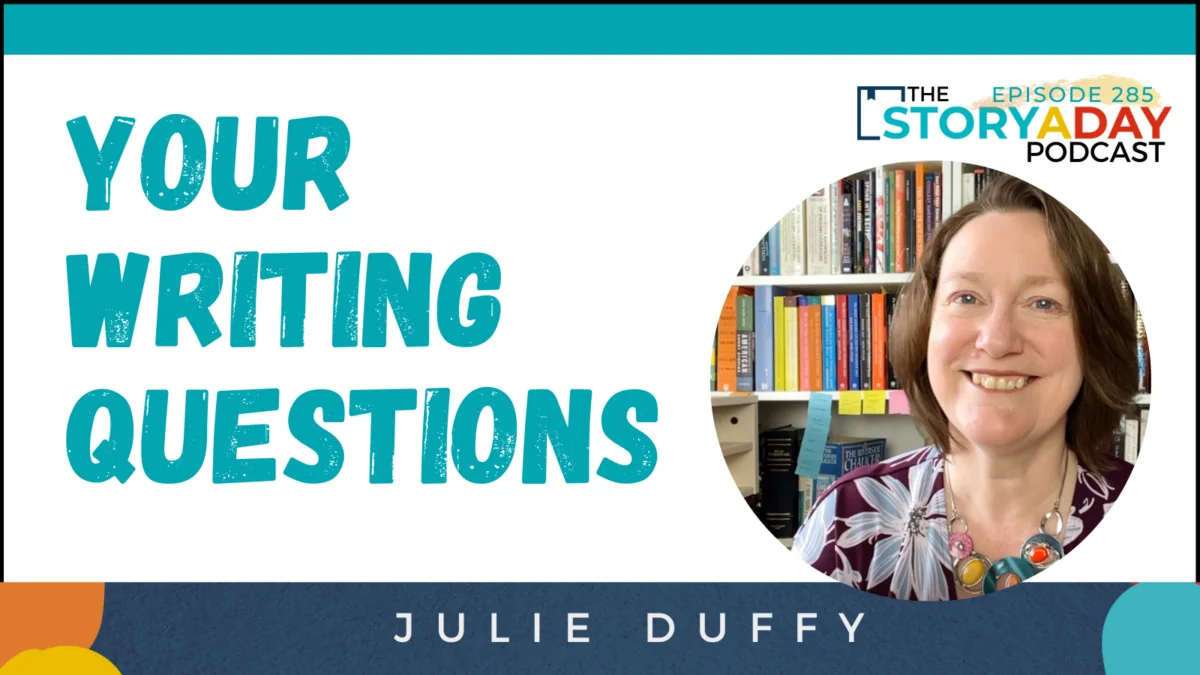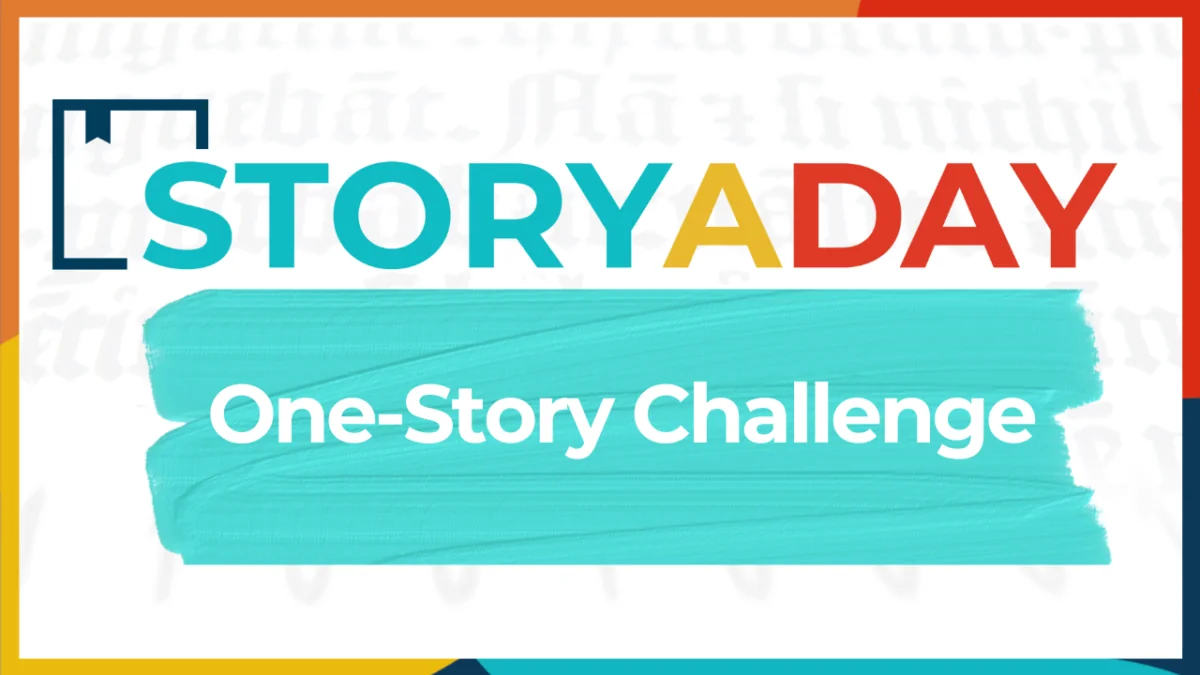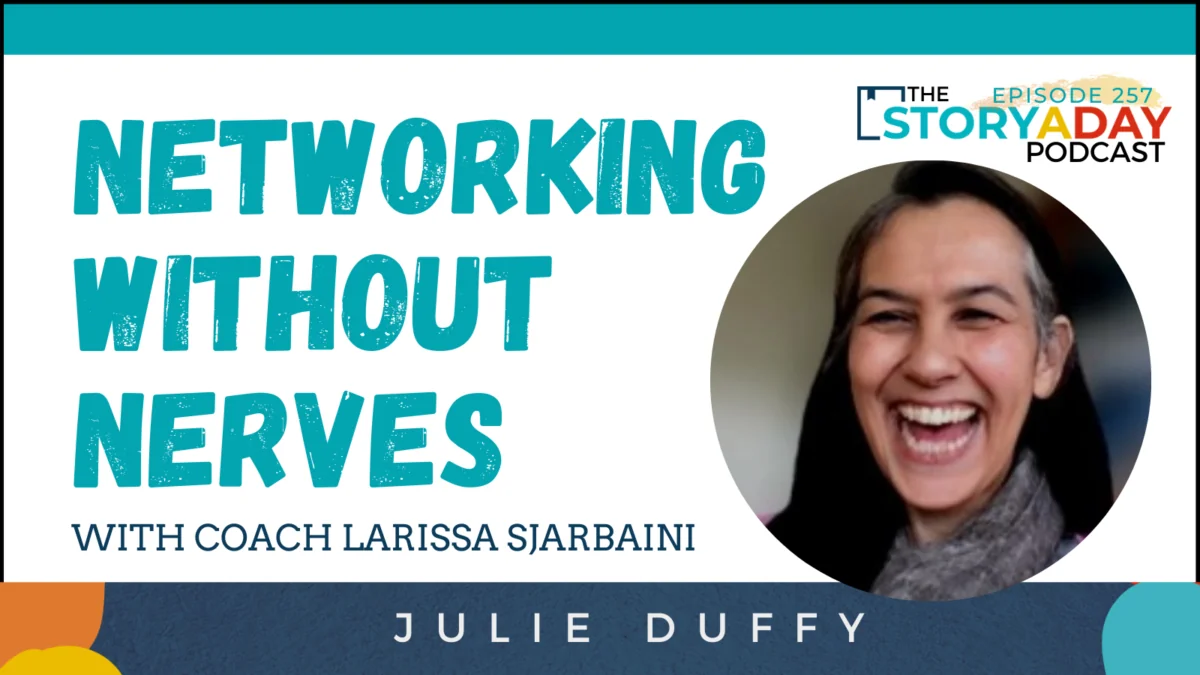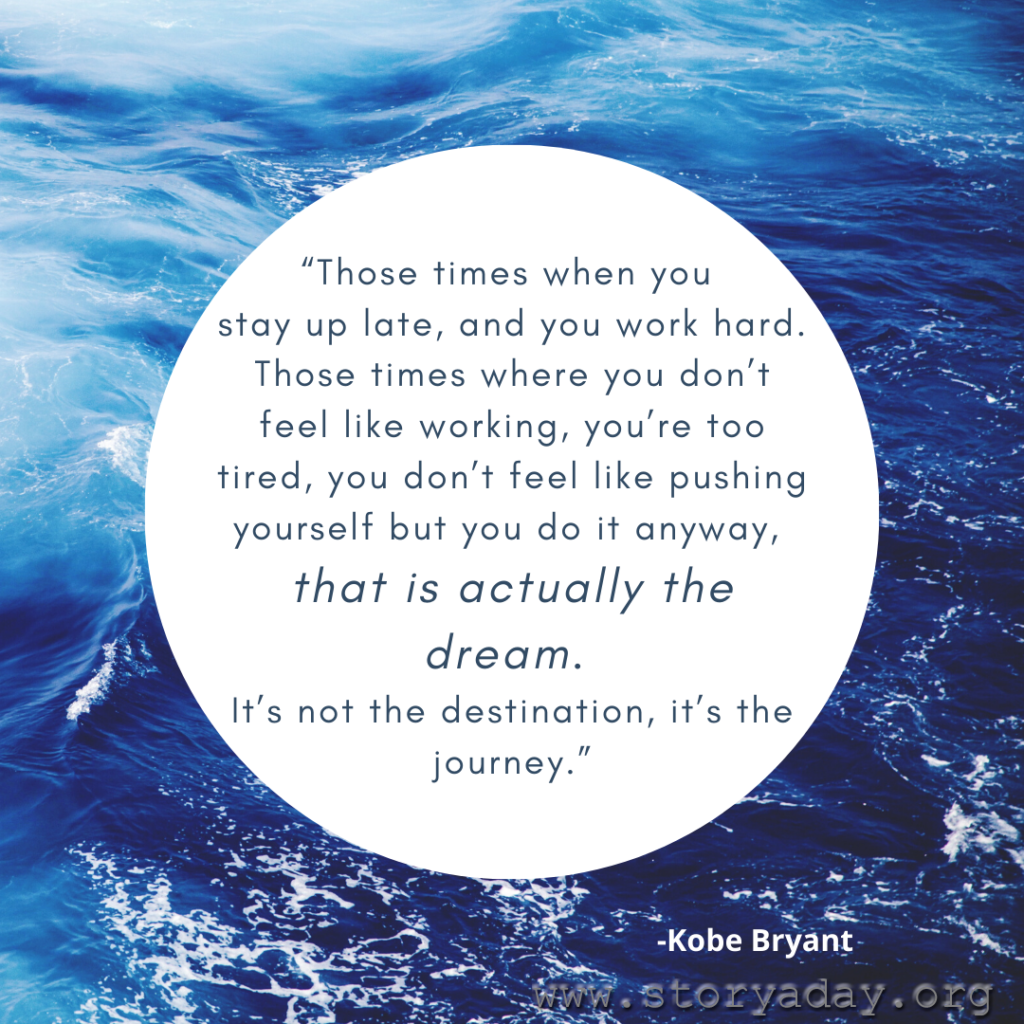On this episode of The StoryADay Podcast, I discuss how to manage fear when it comes to writing, and how to overcome common struggles that writers often face.
You’ll learn why taking action is key to managing fear, and how participating in Story A Day can help with perfectionism and encourage creativity.
I also dive into the importance of having a deeper purpose for writing, and how to find motivation when it feels impossible to make time for writing.
Tune in to hear about the Story A Day Superstars Group and how it can help writers build community and celebrate their successes.
Plus, learn tips and tricks for acquiring and polishing writing skills. T
his is a must-listen episode for anyone looking to find inspiration, motivation, and guidance on their journey as a writer.
LINKS
Sign up for the StoryADay Challenge
Find out more about the Superstars group
Watch vvv
TRANSCRIPT
StADa285 StoryADay QA
Good morning. Good evening. Good afternoon, Julie, from StoryADay here.
We are a little over a week away from StoryADay May.
[00:00:21] Survey Responses – challenges
I sent out a survey recently asking you all. About your secret dream for your writing life? I talked a little bit about that in the last episode. I also asked about people’s biggest challenge.
When it comes to writing at this moment in your life. And that’s what the first question. There was a lot of very personal heartfelt. Honesty in the answers. And there was a lot of. Similarity between what you all had to say. Everyone has their own take on it. There were certain people struggling with different areas of writing.
But, and none of it surprised me and none of it made me feel like any of you needed to quit. I think what we need to do. Is acknowledged that writing is hard. And there’s no better way to do that than to hang out with other writers because I, I. See this, I see all these answers and I’m staring at a screen of them right now.
I see all these answers and it’s all stuff I’ve heard. From other writers that I’ve been hanging out with, who are going through the process of writing.
And I’ve been hanging out with them for the past couple of decades and this stuff is. Is part of the process of writing. So let’s talk about what am I talking about? Things that I see in the survey.
[00:01:50] Writing Is Hard, M’Kay?
Making time and space to sit and write every day. Consistency of output, finishing what I’ve started. The confidence to keep making, moving forward, having the team and capacity to rate. All of these things. Are. Incredibly common among us. It’s very difficult. To take words. And create worlds.
And create interesting characters. And put them in fascinating situations that have twists and turns and can hold somebody’s interest. And we all read these wonderful books that have been published that have been through the polishing process and the revision process and the draft after draft, to get them to be
brilliant and twisty and fascinating. And much less often do we get to look at first drafts. Second drafts. Or to hear from writers who are going through that process.
It turns out that.
[00:03:06] Mythbusting
Everything we think we need to do in writing usually comes with an asterisk. Yeah, you have to write a polished draft that goes through multiple revisions. Except some of it may not. You might actually. write a great couple of scenes that stay intact all the way through the process.
Yeah, you have to write consistently, but consistently doesn’t mean every day.
It means keep coming back to it. Don’t leave a three year gap between stories that you’ve written.
[00:03:37] Fear is Managable
People who are retired or out of work will tell you that simply having space and time for your writing does not guarantee that you’re going to be able to sit down and write, because once you’ve solved the time and space issue. Then you have to deal with all the inner stuff. Am I good enough? Do I know what I’m doing? The fear of of not being good enough.
Which is by far the harder problem to solve. It is solvable. Because. Those kinds of fears. Am I good enough. Am I going to be able to, am I interesting enough? I’m going to be able to write this way or that way, these. Once you acknowledge that chatter is happening in your head. You can give it a name and that name is fear.
And once you have a name for it, you can start thinking about it. And once you start thinking about it, you look at these questions that are popping up in your head about, are you good enough? Can you do this? Can you write an eight? Eight 80,000 word novel. Can you tell an interesting story? All of these things are skills.
That you can acquire that you can build that you can polish.
And the thing about fear as the bravest people in the world will tell you. Is that it doesn’t go away. You just get better at managing how much power it has over you and the way to manage that power that it has over you. Is by taking action and doing a thing. So if you’re feeling fear,
The best thing to do is just to write anyway. It won’t be as bad as you thought and the , next time you feel that fear, you will know that you can push through it. And the more you do that, the less of a hold fear. Has over you.
So if you are. Avoiding your writing for some reason, if you are sitting down at your desk and then stepping away to do something more easy, clean the kitchen or do the laundry or make a meal. These are things that you know how to do. So they are easier, even if they’re not more enjoyable, they might be, but I don’t know who you are. If you enjoy cleaning the kitchen
more than you enjoyed writing. The point is. That. If you don’t know why you’re getting up and running away from your desk. Whenever you want to sit down and write it’s possibly fear-based. So call it that and then have a look inside and see what those fears are. Are they about. You’re afraid that you’re going to write a boring story. Okay.
Then write a boring story and then go and figure out how to make it more interesting. Don’t wait for it to come out perfectly, and be interesting on the first shot. Write some characters don’t put them in a setting, ask them some questions. What do you want and why can’t you, why don’t you have it already? And then start listening to what.
What comes out of your brain as you write, and you have to be writing for those answers to appear.
And once you’ve written your boring story, you’ll discover that the world did not end. And you get to write more stories or you get to revise this story. But nothing permanent happened. And if you feel like nothing happened in your story, then you go and you read some articles or a book about story structure, or how to add tension to a story or how to inject conflict into a story.
And you go and ask other writers, how do you do this? I had an example of this the other day. I’m writing. I’m writing a romance. I got a little stuck and I talked to a friend of mine who specializes in romance.
And I told her the story and I told her what was happening and how I’d set it all up. And she immediately asked me one question that made me realize what my story was lacking. And it was just, she just has that skill in her toolbox that she understands that genres so well that as I was fumbling through telling her my story, she realized there was a huge piece missing.
And she asked me where’s this piece. And I said, I haven’t written it into the story. And she went well, start there and it was just a very low key question from her because she understood. The skill she has these tools. And she asked. The right question.
If you have fear about not being good enough, It might just be a lack of skills. You just don’t know if you have the skills you need, in which case you get to pursue the skills, you got to go find them. You get to ask people questions and say how do you do this? And if you’re hanging out with other writers, you’ve got a wealth of people to do that with. The good news for you is that the internet is full of writers who are very happy to talk about their process. So there’s tons of interviews and there’s tons of classes you can take. There’s tons of groups you can join to find other writers.
Even if you’re introverted. Joining a group and being with other people who are pursuing this difficult thing. Has been transformational for me. And for, I think a number of people. In the story of the superstars, which is opening up again soon. So keep an eye on your emails for that.
So if you have time and space to write and you’re running up against that fear there. There are some things that you can do to help yourself keep moving.
[00:09:09] Finding Time
I think one of the things that we all have to do, and this will. Address those of you who said that you have. Trouble finding or making time to right now, there are genuinely lives out there that are very busy.
And especially those of you with young children or people, other people that you’re looking after or demanding jobs, or maybe three demanding jobs. Making time is tricky.
For some of us that is less tricky. But for all of us. The thing that will make it more compelling. For us to make time for a writing. Is to manage the motivation question. This was another one that I saw coming up for people was that they were struggling with finding the motivation to write, keeping the momentum going.
All of these kinds of words, cropping up in the survey. And the most powerful thing. I have. Discovered in this area. Is to think of other people.
To remove yourself from the equation a little bit. And weight more heavily the people who will be impacted by your story. And you can think about when you were a kid. And you read that book that just made you feel seen, that entertained you when you were down, that. Just moved you. And this doesn’t have to be when you were a kid, it could be last week.
If you think about that. And if you can keep your thoughts, cause I know you’ve got your thoughts, recent mailer minute. That’s why you’re a writer. You’re very creative. You’re very imaginative. I knew tend. I am speaking for myself. When you start thinking, doing this thought exercise.
It’s very common to think about. Oh, I want to create something like that, that, that moves someone and then respond to oh, but. Oh, but oh, . I have to write it all, but I have to finish it, or, but I’m not good at this, or, but I have to figure out how to get it published and blah, blah, blah, blah, blah, blah, blah. But that stuff is a different skill set. That is managing the business of being a writer professionally.
And you have to learn to put these things in silos and move that one over there. Let’s not think about that today. What we’re thinking about today is really. Thinking about your. Ideal reader. And.
Feel the love. For that ideal reader.
I know, it’s motivating to think about, getting checks from publishing houses and production companies and all of that kind of stuff. That’s great. That’s fine. That’s motivating. That gets you excited. Go for it. But it doesn’t tend to last as much because we’re all sensible people and we’re aware that there’s a certain amount of luck involved in there.
And you can’t guarantee that’s going to happen. You can guarantee that you can write something that will move someone. And if you have that, someone in mind, even a a theoretical person or somebody real from your life. It may be somebody who’s departed from your life already. And focusing on doing your best work
and trying to move that person, trying to reach that person, trying to help that person.
We’re pretty altruistic. I think. Most of us. And the idea of helping someone else is a really good way. to. Get over. A lack of confidence in ourselves.
If I was standing in front of you, and I cut my hand and I was bleeding and holding it out to you. I don’t think any of you would go, oh, I don’t really know what to do, but I’ll just, you just stand there with your hand bleeding. No, you’d grab a paper towel and you’d. Hand it to me and save, I don’t know, put pressure on it because , you know, that much.
And I don’t think anybody who’s listening to this, wouldn’t do that for me.
You don’t need to know how to do things perfectly, to be able to help people, touch people, move people, see people. If that helps you. Shift, focus from your shortcomings as a writer. To your aspiration. To help someone else. If that is motivating to you. Then hang on to that one.
And once you have that kind of motivation, whichever one you choose that really. Grabs you and moves you. Once you have that motivation in your mind.
You will. Find it harder to not find the time to write. So if you’re struggling to make time to write.
Keep in mind that deeper purpose that you have for writing. And you will find yourself much more motivated to cram little bits of writing into the little bits of time you can find. And two. Carve out pieces of time. Elsewhere.
[00:14:11] Overwhelm
We do have big dreams. And a lot of answers from people who have this big dream of publishing a novel. Getting the movie deal, but. They are. New mothers or. Have elderly parents to look after. And so the whole big goal of writing or finishing the novel, or this is also for people who’ve lost momentum and are one person said, which I think is brilliant.
When I’ve lost momentum on a project, getting started again feels like standing at the base of Everest in flip-flops. Tell me that’s not a writer.
Overwhelm. It’s really common. And. This will not be news to you, but the idea of chunking things down, making them manageable, doing what you can today and not worrying about the whole project,
is really the only way to get anything done. If you are feeling like you’re not being consistent enough or that you don’t have enough time, that you can’t imagine rating. 80,000 words on one project, you don’t have to. Not today. You have to write the next scene. Or you have to think about the next scene.
Maybe map out the next scene, what does it need to achieve? Who’s going to be in it. Where are they going to be standing relative to each other? Maybe that’s all you can do today. But that means that when you sit down tomorrow, you’ll have that roadmap and you’ll be able to maybe write. 500 words, 300 words of that scene.
We tend to be very ambitious, which is good, but we also tend to be ambitious, which is bad. Because we want to write 2000 words every day and we want to finish a story every day. Now I’m going to encourage you to do that during May , but that’s not a sustainable goal for the rest of your life. And that’s part of the reason.
That I do story a day, because I want you to understand that some days you’re going to fail and some days you’re going to write badly and some days you’re not going to finish and you just get up and keep going the next day. And then at the end of a month, Look what you did. You wrote all of these words, all of these stories or partial stories and you weren’t perfect.
And. You still produced a bunch of stuff and you had fun.
You know what I’m going to say next perfectionism. Whether or not you think of yourself as a perfectionist. I certainly don’t think of myself as a perfectionist and yet. Perfectionism creeps in. We have to battle it.
You don’t have to be consistent in a way that doesn’t feel right for you. You don’t have to finish everything. You don’t have to write a good story.
You don’t have to have a perfect writing practice. You don’t have to have a perfect system, for getting your stories out to market. You just have to keep coming back. And B. Optimistic and hope filled about it.
[00:17:14] Want More Julie?
There’s so much more and I’ll be coming back to these questions on your responses. In future episodes.
I’m always really touched when people contact me after I released these podcasts and tell me that I said just what they needed to hear. Inspired them to keep going, something like that. But it’s not magic. The reason I know what’s going on in your head is because I spend a lot of time with writers.
These kinds of questions come up in our StoryADay Superstars group, which is a group that gets together monthly for Hangouts to talk through issues like this. But also during the week, we have lots of writing dates where we get together and we actually hold each other accountable. Actually sit and write together on zoom calls.
And in the breaks in those calls, these kinds of questions come up as well. And we talk about them. You’re able to, if you’re in that group, you’re able to ask me very specific questions about your writing and the particular project you’re working on. And I, and the other writers in the group are able to ask you very specific questions about what exactly is going on, where the problem arises.
What, what is stalling you? What particular, you know, character issues are you having that kind of thing? So as well as the workshops that we do together really the benefit of. Being in the Superstars group, which is, as I have mentioned, opening up again soon. Is that you get. Basically more me.
You get more eyes on your specific problems. You don’t have to listen to me talking about these generic writer problems. You actually get. Coached on your specific. Issues. And. You get to celebrate with people who understand. The nuances of the writing life. So, if you are interested in. Finding a group like that in getting more access to me to get my eyes on your particular writing practice.
Come over to story day.org. Get yourself on my mailing list by putting your name in one of those sign up boxes. And I will email you this week to let you know more. About how you get into this group, which is like being at the best writers conference or workshop, but all year round.
Remember StoryADay May start soon so make sure you’re signed up for that. at StoryADay.org/signup
[00:19:45] Support the podcast
And finally a remainder that know you can support this podcast, if you would like to, which some people have asked me about and to do that, you go to glow.fm/storyaday, and you can make a one-time or recurring donation to keep the show going. And I really appreciate your support. That’s it from me this week. Happy writing. And I’ll see you again soon.




